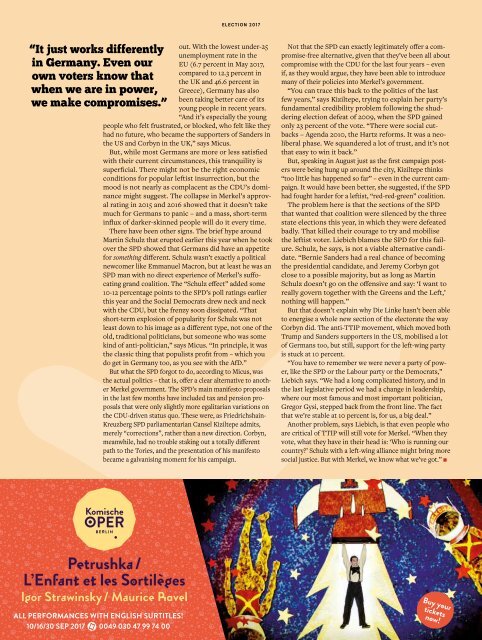EXBERLINER Issue 163, September 2017
You also want an ePaper? Increase the reach of your titles
YUMPU automatically turns print PDFs into web optimized ePapers that Google loves.
ELECTION <strong>2017</strong><br />
“It just works differently<br />
in Germany. Even our<br />
own voters know that<br />
when we are in power,<br />
we make compromises.”<br />
out. With the lowest under-25<br />
unemployment rate in the<br />
EU (6.7 percent in May <strong>2017</strong>,<br />
compared to 12.3 percent in<br />
the UK and 46.6 percent in<br />
Greece), Germany has also<br />
been taking better care of its<br />
young people in recent years.<br />
“And it’s especially the young<br />
people who felt frustrated, or blocked, who felt like they<br />
had no future, who became the supporters of Sanders in<br />
the US and Corbyn in the UK,” says Micus.<br />
But, while most Germans are more or less satisfied<br />
with their current circumstances, this tranquility is<br />
superficial. There might not be the right economic<br />
conditions for popular leftist insurrection, but the<br />
mood is not nearly as complacent as the CDU’s dominance<br />
might suggest. The collapse in Merkel’s approval<br />
rating in 2015 and 2016 showed that it doesn’t take<br />
much for Germans to panic – and a mass, short-term<br />
influx of darker-skinned people will do it every time.<br />
There have been other signs. The brief hype around<br />
Martin Schulz that erupted earlier this year when he took<br />
over the SPD showed that Germans did have an appetite<br />
for something different. Schulz wasn’t exactly a political<br />
newcomer like Emmanuel Macron, but at least he was an<br />
SPD man with no direct experience of Merkel’s suffocating<br />
grand coalition. The “Schulz effect” added some<br />
10-12 percentage points to the SPD’s poll ratings earlier<br />
this year and the Social Democrats drew neck and neck<br />
with the CDU, but the frenzy soon dissipated. “That<br />
short-term explosion of popularity for Schulz was not<br />
least down to his image as a different type, not one of the<br />
old, traditional politicians, but someone who was some<br />
kind of anti-politician,” says Micus. “In principle, it was<br />
the classic thing that populists profit from – which you<br />
do get in Germany too, as you see with the AfD.”<br />
But what the SPD forgot to do, according to Micus, was<br />
the actual politics – that is, offer a clear alternative to another<br />
Merkel government. The SPD’s main manifesto proposals<br />
in the last few months have included tax and pension proposals<br />
that were only slightly more egalitarian variations on<br />
the CDU-driven status quo. These were, as Friedrichshain-<br />
Kreuzberg SPD parliamentarian Cansel Kiziltepe admits,<br />
merely “corrections”, rather than a new direction. Corbyn,<br />
meanwhile, had no trouble staking out a totally different<br />
path to the Tories, and the presentation of his manifesto<br />
became a galvanising moment for his campaign.<br />
Not that the SPD can exactly legitimately offer a compromise-free<br />
alternative, given that they’ve been all about<br />
compromise with the CDU for the last four years – even<br />
if, as they would argue, they have been able to introduce<br />
many of their policies into Merkel’s government.<br />
“You can trace this back to the politics of the last<br />
few years,” says Kiziltepe, trying to explain her party’s<br />
fundamental credibility problem following the shuddering<br />
election defeat of 2009, when the SPD gained<br />
only 23 percent of the vote. “There were social cutbacks<br />
– Agenda 2010, the Hartz reforms. It was a neoliberal<br />
phase. We squandered a lot of trust, and it’s not<br />
that easy to win it back.”<br />
But, speaking in August just as the first campaign posters<br />
were being hung up around the city, Kiziltepe thinks<br />
“too little has happened so far” – even in the current campaign.<br />
It would have been better, she suggested, if the SPD<br />
had fought harder for a leftist, “red-red-green” coalition.<br />
The problem here is that the sections of the SPD<br />
that wanted that coalition were silenced by the three<br />
state elections this year, in which they were defeated<br />
badly. That killed their courage to try and mobilise<br />
the leftist voter. Liebich blames the SPD for this failure.<br />
Schulz, he says, is not a viable alternative candidate.<br />
“Bernie Sanders had a real chance of becoming<br />
the presidential candidate, and Jeremy Corbyn got<br />
close to a possible majority, but as long as Martin<br />
Schulz doesn’t go on the offensive and say: ‘I want to<br />
really govern together with the Greens and the Left,’<br />
nothing will happen.”<br />
But that doesn’t explain why Die Linke hasn’t been able<br />
to energise a whole new section of the electorate the way<br />
Corbyn did. The anti-TTIP movement, which moved both<br />
Trump and Sanders supporters in the US, mobilised a lot<br />
of Germans too, but still, support for the left-wing party<br />
is stuck at 10 percent.<br />
“You have to remember we were never a party of power,<br />
like the SPD or the Labour party or the Democrats,”<br />
Liebich says. “We had a long complicated history, and in<br />
the last legislative period we had a change in leadership,<br />
where our most famous and most important politician,<br />
Gregor Gysi, stepped back from the front line. The fact<br />
that we’re stable at 10 percent is, for us, a big deal.”<br />
Another problem, says Liebich, is that even people who<br />
are critical of TTIP will still vote for Merkel. “When they<br />
vote, what they have in their head is: ‘Who is running our<br />
country?’ Schulz with a left-wing alliance might bring more<br />
social justice. But with Merkel, we know what we’ve got.” ■<br />
Petrushka /<br />
L’Enfant et les Sortilèges<br />
Igor Strawinsky / Maurice Ravel<br />
ALL PERFORMANCES WITH ENGLISH SURTITLES!<br />
10/16/30 SEP <strong>2017</strong> 0049 030 47 99 74 00<br />
Buy your<br />
tickets<br />
now!<br />
JULY/AUGUST <strong>2017</strong> 13<br />
All performances with english surtitles!


















